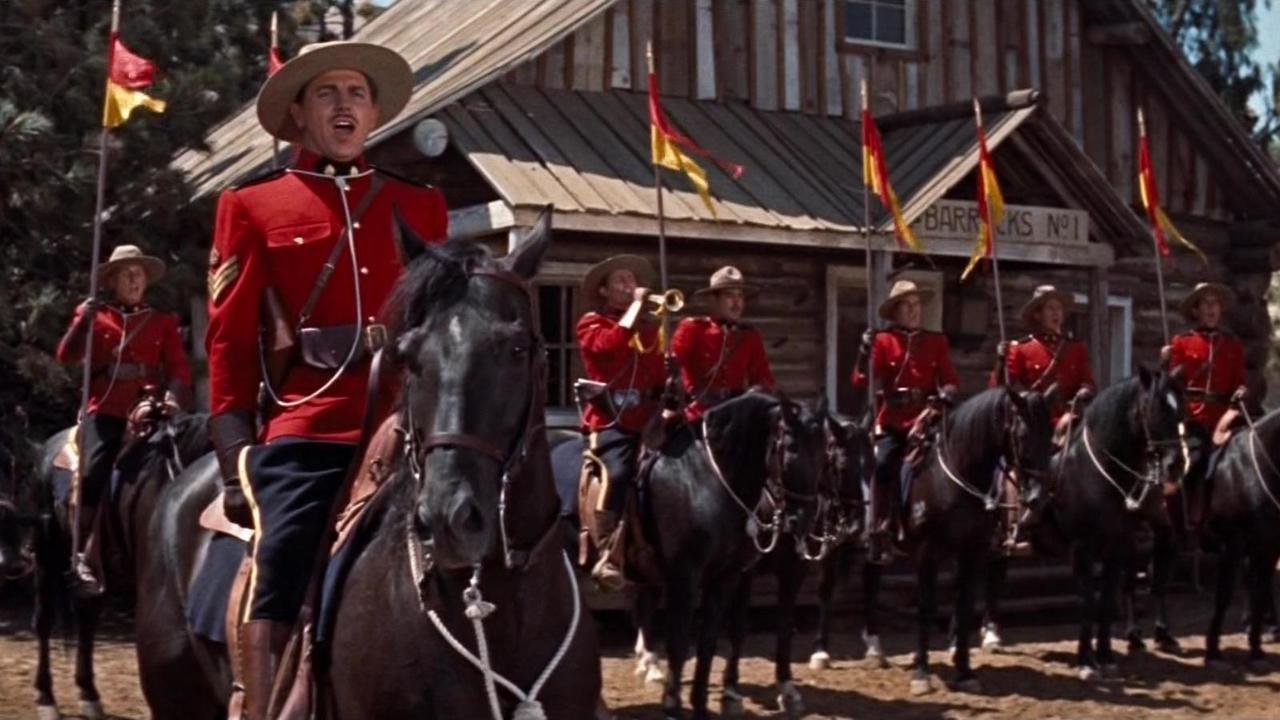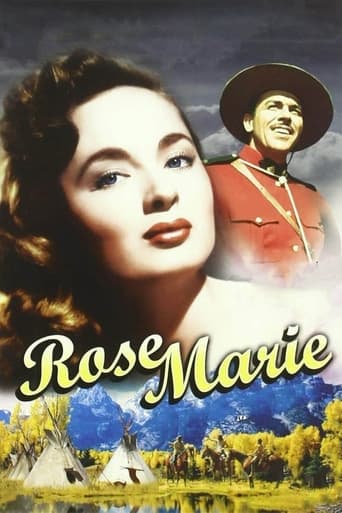

The classic operetta, filmed into a movie in 1936 with Jeanette MacDonald and Nelson Eddy, was remade in 1954, but with significant changes. If you're used to the plot from the earlier version, you'll be surprised by this remake. It was an obvious choice to place Howard Keel in the leading role, since he'd twice played a character who fell for a tomboy after she had a makeover. Ann Blythe took the title role, but even though she tried really hard, I found rather irritating. Her French accent wasn't very good, and she didn't really bring anything to the already unlikable character. She plays a rough-and-tough young girl, brought up around Canadian Mounties, who doesn't really understand what it means to be a woman. Just when the sparks are starting to fly between her and Howard Keel, she gets distracted by no-good Fernando Lamas! It doesn't make any sense, and Fernando is portrayed as a scoundrel through and through.All in all, it's wonderful to hear Howard Keel singing the title song, but I'm not the biggest fan of the famous "Indian Love Call" song, sung between Ann and Fernando. Unless you really love this musical, or Ann Blythe, I recommend sticking with Annie Get Your Gun.
... View MoreThe cannon of Jeanette MacDonald and Nelson Eddy films have created a cult following over the years, and that fan base is well deserved. Of their movies, only one, "Rose Marie", was remade, although it is quite different from their version, which was a remake as well. All three versions take place in the Canadian Rockies and focus the love a rugged Mountie has for the titled character. In this version, Rose Marie (the lovely Ann Blyth) is a tomboy who is "Free to Be Free" until Mountie Howard Keel has her introduced to hotel proprietor Marjorie Main with (get this!) the purpose of turning her into a lady. Keel falls in love with the transformed Blyth, but she only loves trapper Fernando Lamas who is wanted for murder.Unlike MacDonald and Eddy's version, it is not Rose Marie and the Mountie who sing the famous "Indian Love Call"; Lamas's trapper gets that honor, and it is one of the most beautiful duets on screen. (The same year, Jane Powell and Vic Damone did a beautiful duet of "Will You Remember?" from "Maytime" in the Sigmund Romberg bio pic "Deep in My Heart", making three Eddy/MacDonald duets recreated on screen that year, the other being "Deep in My Heart's" "Lover Come Back to Me" from "New Moon"). Keel gets to sing the rousing "Here Come the Mounties", but unfortunately doesn't share a duet with Blyth. That would be saved for Jane Powell and the similar backwoods setting of the same year's masterpiece "Seven Brides For Seven Brothers".If the thought of Main as a Canadian Henry Higgins doesn't make you laugh, then pair her "Ma Kettle" with "Cowardly Lion" Bert Lahr as an aging Mountie fighting off her advances. A cut song between the two ("Love and Kisses") was on MGM's soundtrack album and later was part of the original "That's Entertainment Part III" additional footage tape of numbers not used for that documentaries theatrical release. Lahr's "The Mountie Who Never Got His Man" (written for the movie) did make it into the released print, and as a nod to his "Wizard of Oz" fans, Lahr utilized some of the same comic grimaces and even some sounds that resemble his lion's roar.An opulent Indian dance ("Tom Tom Totem") was staged by Busby Berkley, and if you can get past the obvious backdrop, you will enjoy it. The fact that movie studios were still making operettas in the mid 1950's is pretty amazing in itself, and the result for "Rose Marie" is one of delightful adult romance.
... View MoreAlthough I love the singing of Jeannette MacDonald and Nelson Eddy, their acting is too much the product of that time, affected. That is why I prefer the 1954 movie version of Rose Marie, with Oscar-winning actress Ann Blyth who has a lovely young-sounding lyric soprano in the title role. The two male leads, Howard Keel and Fernando Lamas, have always been known to be excellent singers, as far back as I can remember.I would like to refute someone's synopsis where he says that Rose Marie and the Mountie fall in love with each other. This is not true. The Mountie (Howard Keel) falls in love with his ward, but Rose Marie's love is Jim Duval (Fernando Lamas). Rose Marie sings "Indian Love Call" and "I Have the Love" to Duval and he to her. These two songs are among the most beautiful love songs ever composed. The exuberant "Free To Be Free" accurately evokes the feeling of preferring the state of "being free." Ann Blyth sings this with just the right amount of emphatic insistence and earnestness. I would love to know where I can purchase the sheet music of these songs, or even the entire Rose Marie songbook (movie version).
... View MoreI first saw this movie as a young girl. I have loved it ever since. How can one miss with 2 incredible men and a young girl with such voices and oh the music. Who cares if Ann Blythe can't sing quite as well as Jeanette McDonald. I love the Tom Boy think. I was one when I was a girl. YOu are suppose to go to a movie to enjoy and come out happy and this movie makes me feel good. I don't go to see if in one seen the actor is wearing black shoes & the next blue when it should be black. WHO CARES. Then you have the scenery. Beautiful. Bert & Margarie. Their characters are so funny & lovable. The whole group of actors make this a funny & enjoyable movie.
... View More